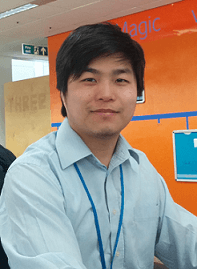Alan Ying, MSc Technology Entrepreneurship 2009 alumnus, tells us why doing a Masters at UCL helped his career as an Senior IT Consultant at FDM Group.
“Growing up in the ‘dot com bubble’ and witnessing the growing potential of the digital world, committing to an IT career was a no-brainer since my childhood. 
I obtained my bachelor degree in Computer Science back in 2008, then moved on to extend my IT knowledge from a business perspective by doing a Master’s in Technology Entrepreneurship at UCL in 2009. I chose this course because I wanted to broaden my understanding within the field of IT and I was particularly interested in the process from an idea to a product on the shelf. The location of the University was perfect, especially as a business course, UCL attracts a fantastic mix of candidates from across the globe, and the all-important business and social events were right on our doorsteps! The course focused on the fundamental concepts of how to survive as a start-up. We had in-depth discussions on business cases and analysed the reasons of success as well as the mistakes we shouldn’t make. As well as learning a great deal on the course, the part I enjoyed the most was the combination of networking and industry insight at the Thursday night events. This involved a guest presentation with entrepreneurs and business aficionados, where they shared their experience and talked us through their ups and downs during their journey to success. I’d also like to stress that the inspirational lead lecturer, Dr Chapman made the course ever so exciting and I much appreciate the time and effort he invested in my class.
I completed my Masters at a difficult time for the economy: for those who are young enough to remember, neither of these two years were ideal for employment, due to the economy meltdown and the bankruptcy of numerous leading financial firms. It was the most challenging time for job hunters in decades! FDM Group was one of the few IT consultancy firms that was still growing during the recession and they were looking for candidates who were bilingual and who held a computer-related degree; it was a perfect match. UCL have a fantastic network that was demonstrated by the career fairs that they organised. The ones that I attended opened my eyes to the possibility and opportunities out there and helped refine my career path after graduation
My 10-week training started immediately after I made it through the interview stages and was accepted onto the Graduate Programme. I was glad to be joining a company with top-notch training facilities, a global network and a market-driven strategy that suited client demands.
Upon completing my training in the Academy I obtained a professional IT qualification that became a game changer in terms of my future career: the ISTQB certificate for Software Testing. FDM Group arranged interviews for me with clients within the banking industry and after a successful interview with HSBC I was placed on site. My first assignment was to cover for a Senior Test Analyst on maternity leave!
No matter how technically talented you are, your first experience in a professional IT environment, especially in one of the biggest banks in the world, is never going to be easy. The amount of industrial and internal terminologies and abbreviations used on a daily basis is comparable to a whole new language; in my early days I kept a mini booklet in my pocket where I wrote down all the new ‘words’ I learnt every day and revised them at night. My FDM Trainer was absolutely spot on when he told me that IT is never a nine-to-five job. After only a few weeks on site I had earned the trust of the HSBC management and was given an opportunity to look after a small project on my own; this really helped my career development and further enhanced my skill-set, helping me to become a better IT Consultant for years to follow.
The second placement I took up through FDM Group was at BGL Group. They were the company behind CompareTheMarket.com and also provided services to create web-based insurance solutions to their co-operate partners and clients. I was brought on board to support the national QA team to protect the intense timelines across numerous projects.
I am now an E2E Test Manager of Barclays Mobile Banking Applications and have been working on various Barclays mobile projects since I was placed at Barclays 4 years ago. My chief responsibility is to amaze our customers by allowing them to experience next-generation digital mobile solutions provided by the Barclays IT Team. No two days are the same at the office and new challenges arise every day. It is important to keep up to date with the latest digital trends, embrace them and integrate them into your own knowledge in order to provide informed and sophisticated advice to customers and clients.
Throughout the years there were a few occasions where FDM Group clients wanted me to become their full time employee but I always ended up politely declining. Even now I appreciate how FDM provides professional training, adapts to the market needs and has an internal and external community with global reach – the exact same reasons I chose FDM Group in the first place.”
For more information, please visit www.fdmgroup.com or for further information about Technology Consultant Careers visit, Careers Tagged.
 Close
Close


 Amazon Cat – Creative Commons/Stephen Woods/Flickr.com
Amazon Cat – Creative Commons/Stephen Woods/Flickr.com .
.
